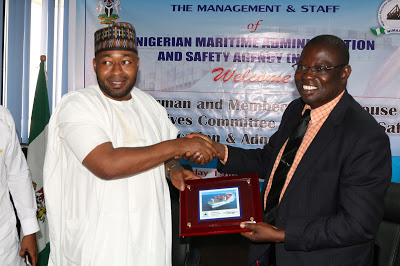The Philippine
Overseas Employment Administration (POEA) has included the Gulf of Guinea-
territorial waters (12 nautical miles) on its list of high-risk destinations,
where Filipino seafarers aboard international sea vessels can collect hazard
pay.
Overseas Employment Administration (POEA) has included the Gulf of Guinea-
territorial waters (12 nautical miles) on its list of high-risk destinations,
where Filipino seafarers aboard international sea vessels can collect hazard
pay.
According to the
POEA, the risk areas include ports and inland waterways of Nigeria and Benin,
terminals and roads, anchorage, the delta of the Niger River, other inland
waterways and port facilities, except only when the vessel is attached securely
to a berth or SBM facility in a guarded port area.
POEA, the risk areas include ports and inland waterways of Nigeria and Benin,
terminals and roads, anchorage, the delta of the Niger River, other inland
waterways and port facilities, except only when the vessel is attached securely
to a berth or SBM facility in a guarded port area.
In its Governing Board Resolution no. 5, series of 2016, POEA enumerated the countries, which it considers as high-risk destinations for sailors due to ongoing internal conflict, being affected with contagious diseases, or infested with pirates.
The measure was the
result of POEA’s International Bargaining Forum, which in conducted last
December with its stakeholders.
The Gulf of Aden, West Indian Ocean and the Red Sea, with the addition of the Internationally Recognized Transit Corridor (IRTC) excluding Yemeni ports, were considered as high risk areas since these are frequented by pirates.
Filipino seamen, who will stay or transit in the Gulf of Aden, will get a bonus pay, and doubled compensation for death and disability depending on the length of their stay in the area.
They will also be allowed the right to refuse sailing, with repatriation at company’s cost and compensation equal to 2 months basic wage.
Those seafarers passing in the West Indian Ocean and the Red Sea of the IRTC will receive the same benefits on the day their ship is attacked, except the right to refuse to sail. Instead, they will be entitled to better best management practice.
In both cases (Gulf of Aden and the West Indian Ocean, Red Sea, and IRTCs), the bonuses and compensation are not payable when the vessel is anchored or berthed in secure ports, except in Somalia.
Somali North Coast and all Ports of Yemen were also included in the POEA’s list and given war-like classification.
Filipino sailors inside the areas with war-like status will get bonus pay equal to their basic wage, payable for 5 days minimum plus per day if longer.
They will also receive doubled compensations for death and disability and a right to refuse sailing, with repatriation at company’s cost and compensation equal to 2 months basic wage.
For Yemen, these benefits will only take effect as long as the ship is berthed in its ports.
“As a vessel departs at berth within Yemen and the last line is let go for departure on passage, the status of being within a war-like operations area shall end,” the resolution said.
Filipino seafarers, who will be sailing in these areas, will be given the following benefits: bonus equal to basic wage, payable for the
actual duration/ transit; doubled compensations for death and disability.
result of POEA’s International Bargaining Forum, which in conducted last
December with its stakeholders.
The Gulf of Aden, West Indian Ocean and the Red Sea, with the addition of the Internationally Recognized Transit Corridor (IRTC) excluding Yemeni ports, were considered as high risk areas since these are frequented by pirates.
Filipino seamen, who will stay or transit in the Gulf of Aden, will get a bonus pay, and doubled compensation for death and disability depending on the length of their stay in the area.
They will also be allowed the right to refuse sailing, with repatriation at company’s cost and compensation equal to 2 months basic wage.
Those seafarers passing in the West Indian Ocean and the Red Sea of the IRTC will receive the same benefits on the day their ship is attacked, except the right to refuse to sail. Instead, they will be entitled to better best management practice.
In both cases (Gulf of Aden and the West Indian Ocean, Red Sea, and IRTCs), the bonuses and compensation are not payable when the vessel is anchored or berthed in secure ports, except in Somalia.
Somali North Coast and all Ports of Yemen were also included in the POEA’s list and given war-like classification.
Filipino sailors inside the areas with war-like status will get bonus pay equal to their basic wage, payable for 5 days minimum plus per day if longer.
They will also receive doubled compensations for death and disability and a right to refuse sailing, with repatriation at company’s cost and compensation equal to 2 months basic wage.
For Yemen, these benefits will only take effect as long as the ship is berthed in its ports.
“As a vessel departs at berth within Yemen and the last line is let go for departure on passage, the status of being within a war-like operations area shall end,” the resolution said.
Filipino seafarers, who will be sailing in these areas, will be given the following benefits: bonus equal to basic wage, payable for the
actual duration/ transit; doubled compensations for death and disability.
They also have the
right to refuse sailing, with repatriation at company’s cost (by submitting
respective notice); and increased security requirements.
right to refuse sailing, with repatriation at company’s cost (by submitting
respective notice); and increased security requirements.

































































